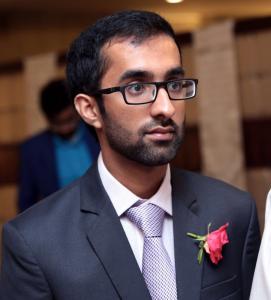Mehdi Ali

Mehdi is a PhD student in Islamic studies and a 2022 recipient of the Ibrahim Rashed Summer Research Grant in the Islamic Religious Sciences.
What will you be doing as the recipient of this prize?
I will be studying a text on uṣūl al-fiqh (foundations of jurisprudence) called the Waraqāt by Imam al-Juwaynī, a famous 11th century legal scholar and Islamic theologian who taught some of the greatest Islamic thinkers. I will be looking at this foundational work along with a commentary by a 13th century scholar by the name of Ibrāhīm al-Fazārī. The original text is around 13 pages while the commentary is around four hundred pages long!
What does your work focus on / revolve around?
I work primarily with Sufi texts that deal with what the Islamic tradition considers to be the gateway to the deepest aspects of the human being, namely, the spirit. One oft-repeated point in texts on Islamic spirituality, however, is that the human spirit is inseparable from the body, the most outward dimension of the human being. A spirituality that does not see the body as an expression of the spirit is considered incomplete and even false, from the Islamic perspective. Therefore, at the urging of my advisor, Professor Casewit, I have undertaken this study of jurisprudence to complement and eventually integrate my understanding of spirituality in Islam.
Why study religion? / Why is what you study important?
Religion is, fittingly, a part of the Humanities. As the name of the larger discipline suggests, religion somehow informs and is informed by the human experience. In the West, as is well known, religion has had a contentious relationship (to put it mildly) with other human pursuits, such as politics, science, and philosophy. Unlike Christianity in the modern West, pre-modern Islam does not have the same dictohomy between the "religious" and the "secular'. My hope, then, is that by studying Islamic texts and doing justice to the way in which they deal with universal human concerns in their unique ways I can throw light on different ways to approach the question of the "relevance" of religion.
What is a favorite course you have taken at the Divinity School and what made it a favorite?
A (with an emphasis on the indefinite article) favorite course that I have taken at the Divinity School is Professor Casewit's Sufism in Morocco course. By focusing around an Arabic text that we read and translated in class, the course was invigorated by the natural poetic majesty of the Arabic language in the hands of an accomplished author. As is usual with Sufi texts, the author oscillated between discussions of Islamic metaphysics and spiritual realization laden with rich technical terms (always a joy), Arabic poetry, poetic prose, and simple yet profound sayings of past Sufi masters. In short, it was a perfect modern-day example of Sufi texts following a line stretching back to the early days of Islam but deeply informed by the intervening centuries: exactly what I envisioned studying when I decided to attend the Divinity School.

